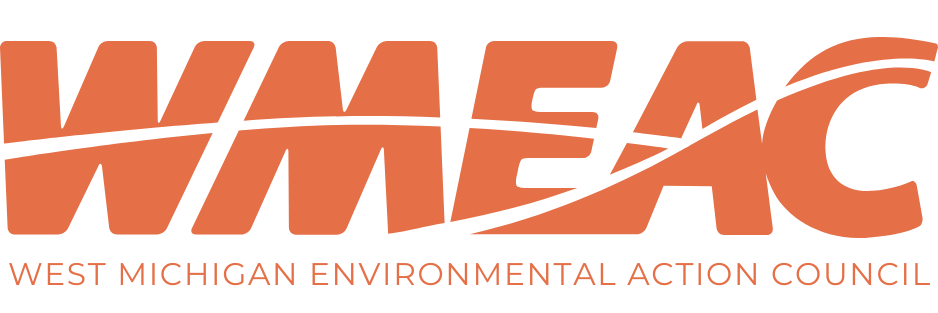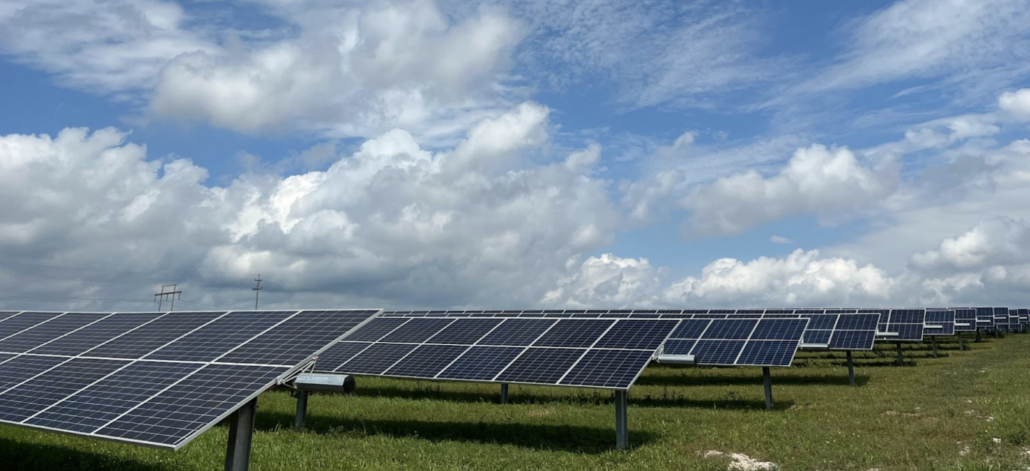By: Samantha Rypstra, WMEAC Lakeshore Fellow
I am a lifelong resident of Muskegon County and a Grand Valley State University student who recently began a fellowship at West Michigan Environmental Action Council (WMEAC), assisting with lakeshore programs and events. As a part of this position I was asked to attend a recent planning commission meeting held by White River Township in northern Muskegon County. The purpose of the meeting and public hearing was to present a revised zoning ordinance for utility-scale solar in the township. Utility-scale solar refers to any large-scale concentrated solar power farm. In recent years, a large-scale solar project has been proposed within the township. The original ordinance allowed larger-scale solar projects with some restrictions, but the new solar ordinance was seeking to restrict it further and make solar projects smaller and more restrained. The public hearing was to be held to receive feedback from local residents, helping the planning commission and township board to determine whether to pass the new ordinance.
Before attending the meeting, I wanted to have a good understanding of the proposed project, the new ordinance, as well as the points of view of people in the community who hold opposing opinions about the issue. I spent some time researching the history of the project in White River Township, as well as similar projects in other areas of the United States. After this research, I felt I had a pretty good understanding of the proposed project, the changes made to the original ordinance, and the different viewpoints of community members.
I learned there is a long timeline of events that led up to the recent meeting. In 2019, the township worked with a solar developer (Lakeside Solar LLC) to create an ordinance friendly to utility-scale solar, which was approved by the planning commission. Lakeside Solar then developed a project, where farmers in the township leased their land to the company for a large-scale 1,700-acre solar installation. There was considerable opposition from residents, with many fearing it would be an “eyesore” that could diminish property values in the area. In October of 2022, the township sent out a survey to residents, asking for their views of the proposed project. Due to the significant opposition, in January of this year, the township passed a moratorium on solar development to update the ordinance. They worked on amendments to the ordinance that were more restrictive to utility-scale solar. In February, Lakeside Solar filed a lawsuit against the township, alleging that the moratorium was illegal and they were denied due process. All this led to the discussion of whether to approve the new ordinance held by the planning commission at the meeting I attended in early April.
This meeting was moved from its usual location to the Montague High School auditorium because it was a larger venue that could better accommodate the expectation of a busy meeting with a lot of involvement from local residents. I could tell from the size of the auditorium where the meeting was held and the number of people pouring into the seats that it was going to be a long meeting with a lot of people with passionate and opposing opinions. Over 50 people spoke and shared their opinions at the hearing, the majority being in favor of the updated and more restrictive solar ordinance. One common theme among those opposed to solar development was the idea of supporting solar but “not in our community.. Unfortunately, while looking at similar projects I found this is a popular opinion in many places when renewable energy projects are proposed. On the other side of the argument, some did not want the amendment passed because they believed it would greatly restrict and delay the installation of renewable solar energy in the township.
I feel strongly that the switch to renewable energy sources such as solar is important for the environment and sustainability because it reduces our dependence on fossil fuels for energy. The current burning of fossil fuels for energy releases large amounts of carbon dioxide into the atmosphere which worsens climate change, pollution and its effects.
It was very interesting to watch the entire process and easy to tell the difference between those who had read and understood the new ordinance and those who hadn’t. It was clear to me the differences between people on both sides of the issue who had prepared their thoughts carefully and people who had wasted their opportunity to speak out by ignoring the rules and speaking at their fellow community members with anger and disrespect instead of patience.
I was able to learn a lot from observing the different approaches of people giving comments. No matter which side of the issue they were on, the speakers who had a good understanding of the topic and who clearly and respectfully stated their concerns left a bigger and better impression on me than those who were disrespectful and impatient. After hearing from many people with opposing opinions, the meeting concluded with the planning commission deciding to recommend the new ordinance to the township board for approval, which it gave at its May 9 meeting.
Upon leaving the meeting, I was feeling pretty discouraged at the number of people who I felt showed a lack of desire for renewable energy and an absence of concern for addressing issues of climate change. As I reflected on the meeting, I attempted to transform that sense of discouragement into motivation to be more involved with similar issues going forward. If this project were happening in my township, and impacting my family and neighbors I would have wanted to be fully involved. This opportunity inspired me to spend more time reading and understanding local issues so that In the future I can become more involved in my community and surrounding areas. It also has inspired me to find more ways to educate others so that there is less opportunity for the spread of misinformation and fear of change to prevent positive changes going forward. As environmentalists, I think sometimes the best thing we can do is turn discouraging news into motivation. When feeling discouraged about environmental issues, we can learn as much as possible and share what we learn with others. The WMEAC website contains a lot of great resources for environmental education, as well as information about local environmental events and volunteer opportunities.
Image is of Macbeth Solar Farm courtesy of Irradiant.


